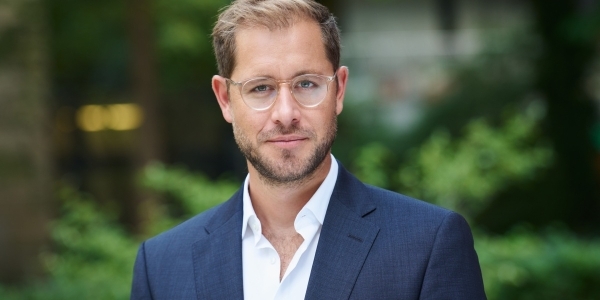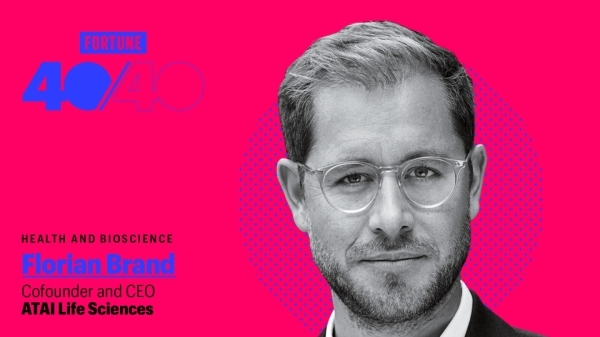
Florian Brand knows that there aren’t many people with his profile in biopharma. “You would probably consider me an outlier,” says the 36-year-old chief executive of Germany’s up-and-coming Atai Life Sciences. He doesn’t have a Ph.D. or any scientific background. His previous gig was running an online cookware retailer. But he does possess a history of profound experiences with mental health—experiences that left such an impression that four years ago he dropped everything to cofound Atai, a biopharmaceutical company now backed by investors including Peter Thiel and Cathie Wood.
Berlin-based Atai is at the forefront of a broadening push to tackle mental health disorders with substances like psilocybin (“magic mushrooms”) and ketamine that have been illegal in many countries for decades. Atai employs an unusual “hub-and-spoke” model, acting as an umbrella for a collection of companies—that Atai either founded or bought a large stake in—each conducting trials on individual substances. Brand’s leadership of this unusual company has landed him on the latest Fortune 40 Under 40 list.
Brand says the closest comparison to Atai is the German startup incubator Rocket Internet, which gained notoriety a decade ago by rapidly cloning the business models of Silicon Valley darlings and rolling out its own copycat versions of the startups. “We usually have a handful of people actually in the subsidiaries—program manager, chief medical officer,” he says, while Atai’s people handle things like regulatory issues and toxicology, where common expertise is needed across all the companies. “We wanted to have a diverse portfolio and then we also wanted to create an entrepreneurial environment where the scientific founders are kept on board.”
Brand, a Hamburg native, personally confronted mental illness at age 15. While attending school in Frankfurt, he developed a severe anxiety disorder. “My heart would start pounding, I’d break into a cold sweat, and I couldn’t think clearly,” he says. “Anxiety turned periodically into panic attacks, which in turn caused me to withdraw socially.” At its worst, his condition led to suicidal thoughts. But he was lucky enough to find a good psychotherapist and responded well to treatment.
The journey that brought Brand and Atai together began in earnest at that aforementioned cookware company, Düsseldorf-based Springlane. Brand was best friends with Lars Wilde, Springlane’s co-CEO, and watched as Wilde tried and failed to treat his own mental illness.
Wilde, who cofounded Springlane, was blindsided when company chef Holger Niltop suffered a massive heart attack while playing with his reggae band and died onstage. Wilde began suffering panic attacks and developed severe depression. He did not respond to the antidepressants he was prescribed, nor to psychotherapy. At one point he collapsed in his office and was found unconscious by Brand (then Springlane’s chief marketing officer) and another colleague. Exhausted, Wilde resigned.
“It was the first time I really saw someone being failed by the mental health care system,” says Brand, who replaced Wilde as Springlane’s co-CEO.


Courtesy of Florian Brand
Around the same time, researchers at Imperial College London and Johns Hopkins in Baltimore published groundbreaking studies that showed psilocybin could have a large positive effect on people suffering from depression and anxiety. That’s when Christian Angermayer, the billionaire German investor and Springlane’s first backer, stepped in. He showed Wilde the data and then guided him through a high-dose psilocybin trip in the Netherlands, where the substance is legally available.
“I was hoping it would help me, but it actually got rid of the condition,” Wilde recounts. “I felt like someone defragmented my brain and put it back in the order it had before I became anxious and depressed.”
In 2016, Wilde cofounded Compass Pathways, a firm dedicated to developing psilocybin-based mental health treatments. Angermayer invested, as did Thiel—who knew Angermayer well—and Galaxy Investment Partners’ Mike Novogratz.
Two years later, Wilde and Angermayer recruited Brand to cofound Atai. They wanted the firm to fund research into a broad array of psychedelics with the aim of treating mental health disorders. Atai added a fourth cofounder in 2019: chief scientific officer Srinivas Rao.
According to Angermayer, the cofounders took detailed personality tests and “aside from Florian, every single one of them got a result that put them into the visionary category of personalities.”
“Florian was the only realist,” the Atai chair says. “Srini is the mad scientist guy, and Flo is the strategic thinker who built the company—that is the unique fit between the two of them,” says Wilde.
Brand’s operational leadership has helped Atai make a splash in a growing industry. Atai led financing rounds for Compass Pathways in 2018 and 2020 and now holds a 22.5% stake in the psilocybin specialist. Compass remains the jewel in Atai’s crown; it recently grabbed headlines for its plan to conduct the largest-ever clinical trial of the compound as a treatment for severe depression.
It’s been a turbulent journey for Atai; its share price is a fifth of what it was a year ago—but the tall, amiable Brand exudes positivity. “I’m very grateful to work on something … that I find truly meaningful,” he says over a coffee at Berlin’s Soho House.
“He’s not doing it for the money,” says Wilde, who last year left Compass Pathways to found drug discovery firm Pangea Botanica but remains an Atai and Compass shareholder. “He wants to see a major change in psychiatry.”
In its early days, Atai didn’t have much luck attracting attention from biopharma-focused investors who, Brand says, were wary of substances that were not “fully validated” in a clinical setting. But the Silicon Valley crowd has been increasingly keen on the potential of psychedelics for both self-improvement and business opportunity, and Atai found several people there who “were quite open and curious about this concept,” Brand says. Thiel and Novogratz were early funders, as was Future Ventures cofounder Steve Jurvetson. “Atai’s great virtue is to take mental illness as seriously as we should have been taking all illness all along,” Thiel said in 2020 at the time of a $24 million Atai financing round in which he participated. “The company’s most valuable asset is its sense of urgency.”
“Atai’s great virtue is to take mental illness as seriously as we should have been taking all illness all along.”
Peter Thiel, Atai investor, in 2020
Atai wasted no time going public. In mid-2021, it raised $225 million at a market cap of $3.2 billion on the Nasdaq. A public debut just three years after launching is an accelerated timeline for any startup, but companies in the Atai family already had clinical trials underway. And although those trials had not produced results yet, academic studies by then had provided evidence that psychedelics could help treat mental illness. Atai was well-placed to benefit from investors’ COVID-era obsession with medical innovation; its roster of big-name backers certainly didn’t hurt.
Before Springlane, Brand toyed with several startup ideas that never cleared the pre-seed stage. He also worked in platform development at Rocket Internet and the e-commerce site Fab.com and did stints in microfinance. His “grit and focus” is serving Atai well, Angermayer says. “In just four years with Florian as CEO we raised more than $600 million, grew the staff to more than 100, brought eight compounds into clinical-stage trials, and took Atai public on the Nasdaq. I’d say that speaks for itself,” he says.
But the period since Atai’s flotation has been anything but plain sailing. Its shares had an IPO price of $15 but are now trading at $2.80. Things went south in late 2021, when Compass Pathways reported positive but not stellar results of a Phase 2b clinical trial of its high-purity psilocybin formulation, Comp360. The results, published in detail in the New England Journal of Medicine in November, showed nearly four in 10 patients with treatment-resistant depression quickly responded well to Comp360. Next up is a Phase 3 trial later this year that will attempt to replicate those results and then improve on them.
Brand argues that the media and retail investors initially misinterpreted the Phase 2b results, particularly the news that some trial participants experienced suicidal thoughts. “Given the patient population,” he noted, such thoughts are “unfortunately very common.” He also points out that the share-price drop “coincided with a general downturn of the biotech market and neuropsychiatry in particular,” and says Atai increased its stake in Compass afterward.
So how will he turn the company around? “Depending on which analysts or financial experts you listen to, the bottom has been reached in biotech or is a few months out, so we will focus on what we can influence,” Brand says, adding that Atai has enough capital to take it through to 2025, by which time some of those clinical trials should have delivered results. “Ultimately in biotech what counts is generating the data, and that usually moves the market and makes investors care about you,” Brand says.
Brand is well suited to “operationalizing a vision,” says Angermayer. Atai’s vision is not without controversy—Compass has been criticized for being aggressive in patenting psychedelics-related intellectual property. But experts say the company is on the right track.
“I think the approach, which is effectively resurrecting older compounds that have been banned, is a very good one for several reasons,” said David Nutt, director of Imperial College London’s Centre for Psychedelic Research, who has advised Compass Pathways (and its rivals) and received a grant from the company. The bans were based on politics, not medical reasons, he says. “There is good historical evidence of efficacy and safety, including lack of addiction,” Nutt says, adding that his team has shown these compounds to interact with the brain in a unique way, “thus adding an important alternative therapeutic option to current therapies.”
Atai’s path forward will involve close cooperation with regulators such as the U.S. Food and Drug Administration, Brand insists. “It’s the right way for patient safety and also to avoid any political backlash,” he said. He notes that there’s bipartisan support in the U.S. for the idea of using psychedelics to treat conditions such as post-traumatic stress disorder (PTSD), which ails many military veterans. That unity is “quite an interesting phenomenon, because in the U.S. there is not a lot of common ground between those parties.”


All in the family
Atai Life Sciences’ best-known bet is Compass Pathways, the psilocybin specialist in which it holds a large stake. But that’s only one of eight companies under the Atai umbrella. Here are three more, all of which are subsidiaries:
Perception Neuroscience
New York–based Perception aims to tackle treatment-resistant depression with a ketamine-based substance. Top-line results from a 100-patient clinical trial are expected in coming months.
DemeRx
DemeRx is developing drugs based on the psychedelic ibogaine, derived from a central African shrub. The Miami-based company hopes it will help people break opioid addictions.
EmpathBio
The firm hopes its MDMA derivative will treat PTSD. The New York City–based company recently got approval to begin clinical trials.
This article appears in the December 2022/January 2023 issue of Fortune with the headline, “The CEO taking psychedelics seriously.”





